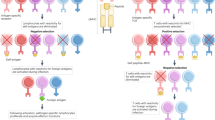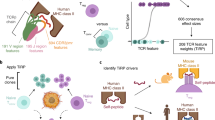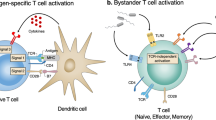Abstract
Cytotoxic T lymphocytes (CTLs) recognize foreign antigens in the context of self major histocompatibility antigens. In the mouse this phenomenon is called H–2 restriction as H–2 is the major histocompatibility complex. Two theories have been proposed to explain the dual requirement for CTLs to kill specifically target cells: (1) the two-receptor hypothesis proposes that T cells have an anti-self H–2 receptor and a distinct anti-foreign (anti-X) receptor1,2; (2) the altered self hypothesis proposes that T cells recognize complex antigens or interaction antigens created by the physical interaction of self H–2 molecules and X in the target cell membrane3,4. Here we report the isolation of CTL clones which recognize H–2k-plus-X and cross-react with H–2d-plus-Y. Because the clones recognize two pairs of antigens and not any combination, for example, H–2k-plus-Y, they support very strongly the principle of altered self recognition, that is, that only the complex of H–2 and foreign antigen is recognized and not either component independently.
This is a preview of subscription content, access via your institution
Access options
Subscribe to this journal
Receive 51 print issues and online access
$199.00 per year
only $3.90 per issue
Buy this article
- Purchase on Springer Link
- Instant access to full article PDF
Prices may be subject to local taxes which are calculated during checkout
Similar content being viewed by others
References
Katz, D. H., Hamaoka, T. & Benacerraf, B. J. exp. Med. 137, 1405–1418 (1973).
Rosenthal, A. S. & Shevach, E. M. J. exp. Med. 138, 1194–1212 (1973).
Zinkernagel, R. M. & Doherty, P. C. Nature 251, 547–548 (1974).
Doherty, P. C., Blanden, R. V. & Zinkernagel, R. M. Transplantn Rev. 29, 89–124 (1976).
Bevan, M. J. Nature 269, 417–418 (1977).
Fink, P. J. & Bevan, M. J. J. exp. Med. 148, 766–775 (1978).
Zinkernagel, R. M. et al. J. exp. Med. 147, 897–911 (1978).
Bailey, D. W. Immunogenetics 2, 249–256 (1975).
Snell, G. D., Dausset, J. & Nathenson, S. Histocompatibility, 401 (Academic, New York, 1976).
Schmitt-Verhulst, A.-M., Pettinelli, C. B., Henkart, P. A., Lunney, J. K. & Shearer, G. M. J. exp. Med. 147, 352–367 (1978).
Ballas, Z. K. & Henney, C. S. J. Immun. 123, 1696–1704 (1979).
Hunig, T. & Bevan, M. J. (in preparation).
Bevan, M. J. & Fink, P. J. Immun. Rev. 42, 3–19 (1978).
Kappler, J. W., Skidmore, B., White, J. & Marrack, P. J. exp. Med. 153, 1198–1214 (1981).
Raulet, D. H., Gottlieb, P. D. & Bevan, M. J. J. Immun. 125, 1136–1143 (1980).
Glasebrook, A. L. & Fitch, F. W. J. exp. Med. 151, 876–894 (1980).
Author information
Authors and Affiliations
Rights and permissions
About this article
Cite this article
Hünig, T., Bevan, M. Specificity of T-cell clones illustrates altered self hypothesis. Nature 294, 460–462 (1981). https://doi.org/10.1038/294460a0
Received:
Accepted:
Issue Date:
DOI: https://doi.org/10.1038/294460a0
This article is cited by
-
The structural basis of alloreactivity
Immunologic Research (1990)
-
The antigen-major histocompatibility complex-T cell receptor interaction
Immunologic Research (1988)
-
Who needs more?
Nature (1987)
-
The human T-cell receptor
Journal of Clinical Immunology (1985)
-
Evidence from in vitro studies that tolerance to self antigens is MHC-restricted
Nature (1984)
Comments
By submitting a comment you agree to abide by our Terms and Community Guidelines. If you find something abusive or that does not comply with our terms or guidelines please flag it as inappropriate.



